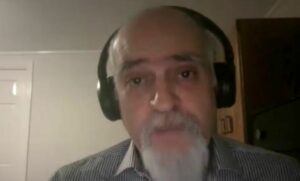The Jewish Federation of Howard County hosted a Zoom discussion on the past, present and post-war future of the Middle East with Dennis Ross and Ghaith al-Omari, moderated by Joel Frankel.
Discussion on the hostage situation dominated the evening – with guest experts thoroughly exploring possible solutions, likely outcomes and contributing factors.
The session, which took place at 7 p.m. on Jan. 16, left commenting attendees feeling informed, with one commenter saying that the discussion helped them sort out their feelings on the future of the Middle East.
The two Middle East policy experts both had long histories with more than two decades each of experience tied to Israel and the prelude to the conflict at hand.
Al-Omari is the Rosalinda and Arthur Gilbert Foundation senior fellow for the Washington Institute to the Irwin Levy family program on the U.S.-Israel strategic relationship. Before this, he was the former executive director of the American Task Force on Palestine and he served as an adviser to the negotiating team during the permanent status talks, which took place from 1999-2001, in addition to holding various other positions within the Palestinian Authority.
The other speaker, Ross, is the counselor and William Davidson distinguished fellow at the Washington Institute. The diplomat also teaches at the Georgetown University Center for Jewish Civilization. Ross was in Israel the week prior to the session.
The session opened with what Frankel admitted was a broad question, “What do you see as Israel’s plan to extract the remaining hostages from Gaza?”

Ross answered that the situation is quickly evolving, with Israeli attitudes shifting from what they were even 10 days prior. One of the reasons for this shift, Ross said, is that a number of the women who were held hostage have been able to tell their stories – which have appeared on interview shows in Israel.
“It had a profound effect upon the body politic. They described the torment, the torture, what was happening to the other women who have not been released, rapes occurred not only before but in captivity,” Ross said. “It just sort of galvanized the set of attitudes that made this the main preoccupation, I think, of the public right now.”
At the time of this publication, more than 100 hostages remain held in Gaza.
“There is a tension, between those who feel that you can’t have an outcome that leaves Hamas in power and there isn’t a willingness to be prepared to pay the price of accepting a cease-fire in return for getting the hostages and the fear is that if you accept that it means it leaves Hamas in power,” Ross said.
On Monday, Jan. 22, The New York Times reported that supporters and relatives of hostages captured in the Oct. 7 attacks burst into a meeting at Israel’s Parliament to demand that lawmakers take greater action to secure the captives’ release from Gaza.
The number of hostages was also a point of discussion during the event.

“I think Hamas looked at previous cases of having hostages and how they could leverage these hostages to get tremendous gains,” al-Omari said.
Al-Omari cited prior gains Hamas has achieved so far with the leverage of the hostages.
“When they conducted Oct. 7, I’d have to assume that they knew that Israel would be acting in a very vigorous way just based on previous rounds of fighting between Israel and Hamas – and I think for them the hostages are also an insurance policy,” al-Omari said.
The discussion on Hamas’s use of hostages bled into a conversation on the future of the Middle East – what it might look like “the day after.”
Al-Omari said it’s too soon to tell what that “day after” might look like because “so much will depend on how the war ends.”
“If Hamas can emerge from this with the ability to say that they won, then there is no doubt in my mind that Hamas would emerge as the leading faction in Israeli politics and for Hamas to claim victory is a very low bar,” al-Omari said. “For Hamas, survival is victory.”







